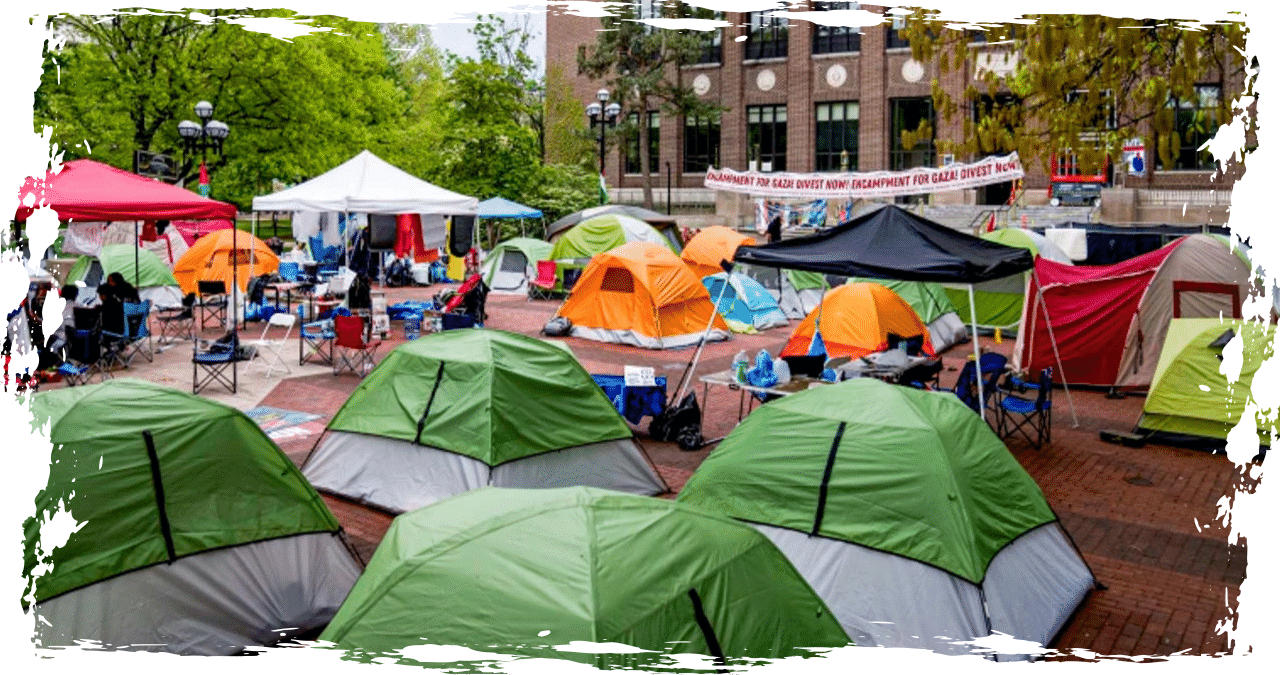Police disbanded a pro-Palestinian encampment at the University of Michigan early Tuesday morning, stating concerns for public safety. This action followed a demonstration where activists placed mock body bags on the lawn of a university official just a week prior.
Approximately 50 people were cleared from the Diag, a historic site for campus protests, by officers wearing helmets with face shields. Video footage circulating online depicted police using what seemed to be an irritant spray, causing the individuals to retreat.
Protesters caused a shift in their location to the Washtenaw County jail, where they showed their support for their allies by marching outside. As a result, the authorities arrested at least four individuals.
The campus encampment, which was established on April 22, coincided with the end of the school year and the arrival of families for spring commencement. Moreover, the protesters went a step further by displaying posters that mocked President Santa Ono and other officials.
After clearing the camp, the authorities proceeded to close down the nearby buildings, which included the undergraduate and graduate libraries. Students who arrived to study were turned away by the police.
In a statement, Ono expressed concern over the encampment’s safety, citing overloaded power sources and open flames as potential threats. He noted that organizers had been uncooperative, refusing to implement necessary changes even after a fire marshal inspection.
According to Ono, the recent failure to comply with safety directives is just one in a series of concerning incidents related to the encampment. The encampment has consistently disregarded the rules that govern the Diag, particularly the rules that guarantee equal access to the space for all individuals.
Protesters are urging the school’s endowment to cease investing in companies affiliated with Israel. However, the university maintains that it does not have any direct investments and only has less than $15 million allocated to funds that may include Israeli companies. This amount accounts for less than 0.1% of the total endowment.
Last week, Sarah Hubbard, chair of the Board of Regents, made a firm statement, declaring that there is no room for further discussion on the matter at hand.
On May 15, a gathering of 30 protesters arrived at Hubbard’s residence and proceeded to place sheets, stained with red to resemble body bags, on her lawn. Demonstrating their dissent, they rhythmically drummed and chanted slogans through a bullhorn.
Other board members also received demands at their doors from individuals wearing face coverings.
Board member Mark Bernstein, a lawyer from the Detroit area, passionately expressed his concerns about the consequences of ignoring antisemitism. He emphasized that failing to address this issue directly impacts individuals’ lives, including his own. Mark stated, “This conduct is where our failure to address antisemitism leads literally — literally — to the front door of my home.” He further questioned who would be targeted next and when this cycle of hatred would come to an end. Being Jewish himself, Mark drew from his community’s history of enduring tragic events and emphasized the urgent need to take action, declaring, “Enough is enough.”
Tent encampments have been established by students and other individuals on campuses across the country, with the aim of urging colleges to sever financial connections with Israel. Tensions surrounding the war have been running high on campuses since the autumn, but the protests gained momentum after a police crackdown on an encampment at Columbia University on April 18. Nationwide, the number of arrests at campuses has now exceeded 3,000.
On Monday, Drexel University in Philadelphia issued a warning that they may disband an encampment. The campus was on lockdown, classes were being conducted online, and law enforcement was closely monitoring the protest.
Drexel employees were instructed to work remotely as a result of the encampment on campus. President John Fry emphasized the disruption caused by the encampment and expressed the need for it to be removed.



